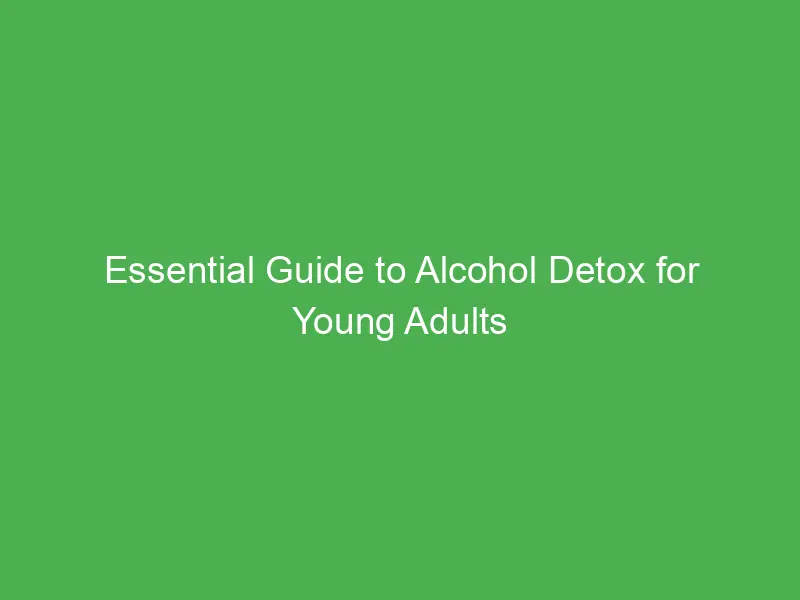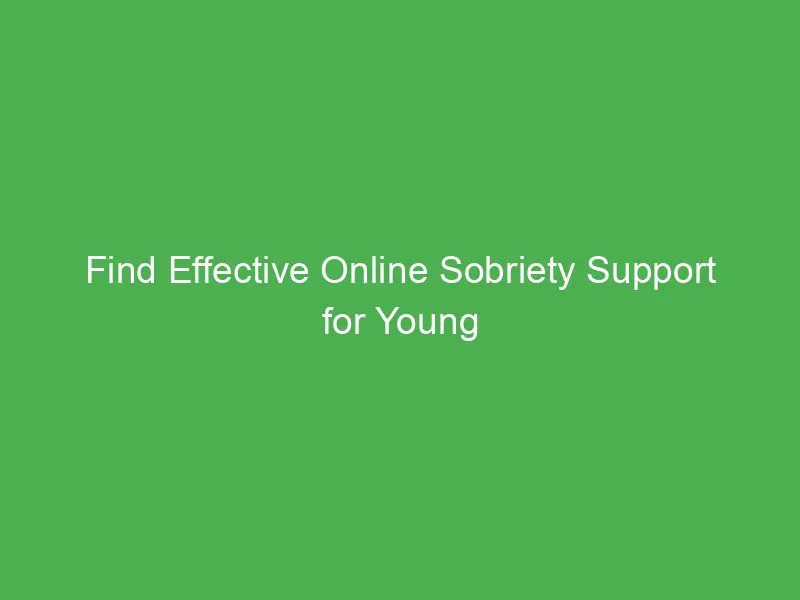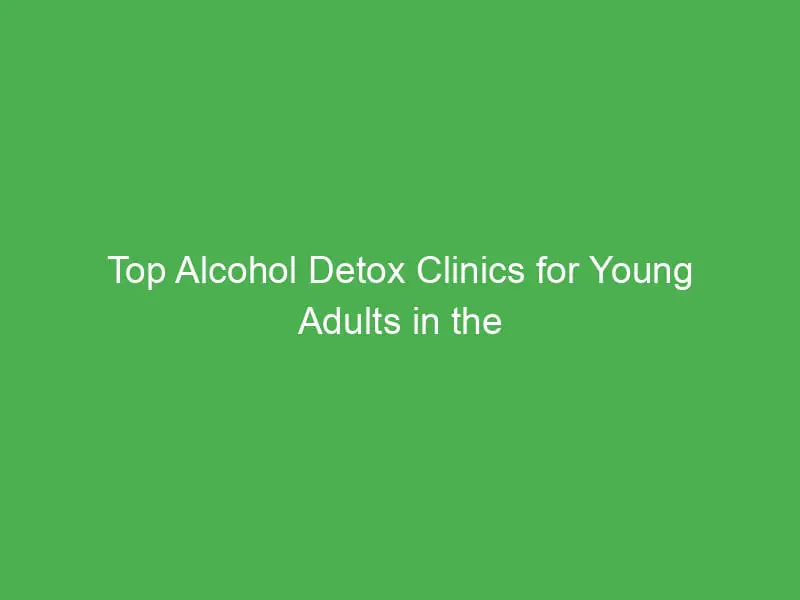In recent years, the conversation around alcohol consumption has shifted dramatically, especially among young adults in the United Kingdom. With rising awareness of the impact of alcohol on mental and physical health, many are now seeking effective ways to detox and reclaim their lives. Alcohol detox offers a crucial first step towards achieving sobriety and improving overall well-being.
For young adults grappling with alcohol dependency, understanding the detox process is vital. It not only helps in breaking the cycle of addiction but also opens doors to healthier lifestyle choices. As more resources become available, including specialised programmes and support networks, young adults can find the guidance they need to navigate this challenging journey. Embracing alcohol detox can lead to a brighter, healthier future, free from the constraints of alcohol.
• What is alcohol detox for young adults in United Kingdom?
Alcohol detox is a medical process aimed at helping individuals, particularly young adults, safely withdraw from alcohol. This crucial step allows them to break the cycle of dependency and restore their health. Here are the main steps involved in alcohol detox for young adults in the UK:
- Assessment: Professionals conduct a comprehensive evaluation of the individual’s alcohol use, overall health, and recent history. This helps determine the specific needs and risks involved in the detox process.
- Medical Supervision: Detox should occur under strict medical supervision to manage withdrawal symptoms effectively. In the UK, healthcare providers often assist with detoxification programmes available in inpatient or outpatient settings.
- Symptom Management: Withdrawal symptoms, which can range from mild to severe, might include anxiety, sweating, and tremors. Medications, such as benzodiazepines, may be prescribed to ease discomfort and reduce risks during this phase.
- Support Services: Access to psychological support is vital. Young adults can engage with counselling sessions, group therapy, or peer support networks that enable shared experiences and coping strategies.
- Nutritional Support: A balanced diet can aid recovery by replenishing essential nutrients depleted by alcohol use. Nutritional counselling is often included as part of detox programmes.
- Aftercare Planning: Upon completing detox, establishing a robust aftercare plan is crucial. This could involve regular counselling, participation in support groups, and lifestyle changes aimed at maintaining sobriety.
- Lifestyle Changes: Encouraging healthy habits, like exercise and mindfulness, can support ongoing recovery. Young adults are urged to explore hobbies and activities that promote a balanced life.
Understanding alcohol detox is essential for young adults seeking sobriety. With the right support and resources, the journey towards recovery can lead to a healthier, alcohol-free life.
• Benefits of alcohol detox for young adults in United Kingdom
- Improved Mental Health
Alcohol detox often leads to improved mental health. Many young adults experience reduced anxiety and depression after detox, as alcohol can exacerbate these issues.
- Enhanced Physical Health
Detoxification allows the body to heal from the damaging effects of alcohol. Young adults may notice weight loss, improved liver function, and enhanced physical fitness as they eliminate alcohol from their diet.
- Increased Clarity and Focus
Alcohol detox promotes mental clarity. Young adults often find that their ability to concentrate improves significantly after reducing or eliminating alcohol intake.
- Better Sleep Patterns
Many individuals report improved sleep quality post-detox. Alcohol disrupts normal sleep cycles, and detox allows for establishment of healthier sleep habits, leading to increased energy levels during the day.
- Stronger Relationships
Alcohol can often strain relationships with family and friends. Detox presents an opportunity for young adults to rebuild these connections and engage more meaningfully with their loved ones.
- Financial Savings
Reducing or eliminating alcohol consumption can lead to substantial financial savings. Young adults can redirect these funds toward healthier activities or personal development.
- Increased Motivation for Activities
Detox often reignites passion for hobbies and interests. Post-detox, young adults may feel more motivated to participate in sober-friendly activities like sports, arts, or community service.
- Supportive Community Engagement
Engaging in detox programmes connects young adults with supportive communities. These networks offer invaluable encouragement and shared experiences, fostering lasting friendships.
- Development of Coping Strategies
Alcohol detox equips young adults with essential coping strategies to handle stress without resorting to alcohol. Skills learned during this process can significantly enhance overall resilience.
- Foundation for Long-Term Sobriety
Successful detox sets a solid foundation for long-term sobriety. Young adults equipped with tools for managing triggers and cravings are better prepared to sustain a balanced, alcohol-free lifestyle.
Choosing the Best Alcohol Detox Programme for Young Adults in the UK
Finding an effective alcohol detox programme can be crucial for young adults seeking recovery. Here are steps to consider:
- Evaluate Qualifications: Check the credentials of detox facilities and staff. Look for institutions accredited by the Care Quality Commission (CQC) or those recognised by professional associations in addiction treatment.
- Research Treatment Options: Investigate various treatment modalities that are available. These may include inpatient or outpatient programmes, counselling, and support groups. Understanding what each programme offers can help in making an informed choice.
- Consider Location: Determine if proximity to home is vital. Some prefer a local detox centre for support, while others may benefit from a distant facility to maintain privacy and focus on recovery.
- Assess Support Services: Evaluate the level of aftercare and ongoing support provided. Quality programmes offer follow-up sessions, support groups, and access to community resources for sustained recovery.
- Read Reviews: Seek testimonials and reviews from previous participants. Online platforms and forums can provide insights into the effectiveness and environment of a facility.
- Consult Healthcare Professionals: Reach out to doctors, therapists, or addiction specialists for recommendations. They can assist in identifying suitable programmes based on the individual’s needs.
- Verify Insurance Coverage: Check if the selected detox programme accepts health insurance. This can significantly affect the overall cost of treatment and accessibility.
- Visit the Facility: If possible, arrange a site visit to assess the environment. Comfort and a supportive atmosphere are critical for recovery.
- Discuss Treatment Philosophy: Understand the approach the facility takes towards detox and recovery. A holistic approach that includes mental health support and lifestyle changes is often beneficial.
- Prioritise Personal Needs: Choose a programme that aligns with personal circumstances, such as age, gender, and specific addiction issues. Tailored programmes tend to yield better outcomes.
These steps can aid in selecting the right alcohol detox programme, contributing to a successful recovery journey for young adults in the UK.
• Best Practices for alcohol detox for young adults in United Kingdom
- Seek Professional Guidance
Engaging a healthcare professional is essential before starting alcohol detox. Qualified clinicians can evaluate the individual’s health and determine appropriate detox strategies based on specific needs.
- Choose a Structured Detox Programme
Opting for a structured detox programme within a reputable facility ensures medical supervision throughout the process. Programmes should offer comprehensive care that includes medical, psychological, and nutritional support.
- Create a Support Network
Building a support network involving family, friends, and peers increases motivation during detox. Support groups, such as Alcoholics Anonymous or local community groups, provide a platform for shared experiences and encouragement.
- Prioritise Mental Health Support
Incorporating counselling or therapy into the detox process addresses underlying psychological issues. Techniques such as cognitive behavioural therapy (CBT) can be beneficial in developing coping strategies.
- Maintain a Balanced Diet
Eating a nutritious diet is vital during detox to restore physical health. Incorporating fruits, vegetables, lean proteins, and complex carbohydrates helps replenish essential nutrients that may have been depleted due to alcohol use.
- Stay Hydrated
Drinking adequate water is crucial for the detox process. Hydration aids in alleviating withdrawal symptoms and helps the body eliminate toxins effectively.
- Set Achievable Goals
Establishing clear, attainable goals throughout the detox journey fosters a sense of accomplishment. Tracking progress encourages individuals to stay committed to their recovery path.
- Engage in Sober Activities
Finding enjoyable activities that don’t involve alcohol helps build a new lifestyle. This could include joining clubs, pursuing hobbies, or trying fitness classes, providing positive outlets for energy and stress relief.
- Plan for Aftercare
Developing a robust aftercare plan ensures continued support post-detox. Regular follow-up appointments with healthcare providers and ongoing participation in support groups help maintain long-term sobriety.
- Stay Patient and Positive
Recognising that detox is a process takes time, and setbacks may occur. Remaining patient and focusing on positive affirmations can significantly strengthen resilience during recovery.
• Common Challenges with alcohol detox for young adults in United Kingdom
- Withdrawal Symptoms
Withdrawal can present a range of symptoms from mild to severe, including anxiety, tremors, nausea, and sweating. It’s crucial for young adults to undergo detox under medical supervision to manage these effectively.
- Cravings and Triggers
Strong urges to consume alcohol often arise during detox, especially when facing familiar social settings or stressors. Identifying personal triggers can help in developing coping strategies.
- Mental Health Issues
Pre-existing mental health conditions can resurface or intensify during detox. Young adults should focus on securing psychological support through counselling or mental health resources to navigate these challenges.
- Social Pressures
Young adults often encounter peer pressure to drink, making it harder to stay committed to sobriety. Building a network of supportive friends or joining sober groups can provide essential encouragement.
- Lack of Support Networks
Some individuals may find themselves without a support system, which can hinder recovery efforts. Engaging in community resources, such as support groups or therapy, can create strong social bonds.
- Financial Concerns
The costs associated with detox programmes may pose challenges. Researching available options, including NHS services or various funding sources, can alleviate financial strain.
- Lifestyle Adjustments
Transitioning from a drinking culture to a sober lifestyle requires significant changes. Exploring new hobbies, activities, or interests that promote a healthy lifestyle can help in this adjustment.
- Aftercare Commitment
Maintaining sobriety after detox is critical and can be challenging without a structured aftercare plan. Young adults should develop a thorough aftercare strategy, including ongoing counselling and participation in recovery-focused activities.
- Acceptance and Self-compassion
It’s important for individuals to acknowledge their journey and practise self-compassion throughout the detox process. Recognising setbacks as part of recovery can foster resilience and a positive mindset.
Key Takeaways
- Understanding Alcohol Detox: Alcohol detox is a crucial medical process for young adults in the UK to safely withdraw from alcohol, helping to break the cycle of dependency and improve health.
- Benefits of Detox: The process can lead to significant improvements in mental and physical health, better sleep patterns, enhanced clarity, and stronger relationships.
- Choosing the Right Programme: Evaluating qualifications, treatment options, and support services is vital when selecting a detox programme to ensure it aligns with personal needs.
- Best Practices: Engaging professional guidance, maintaining a balanced diet, creating a support network, and setting achievable goals can greatly enhance the detox experience.
- Common Challenges: Young adults may face withdrawal symptoms, social pressures, and mental health issues during detox. Establishing coping strategies and having a solid support system are essential for overcoming these obstacles.
- Post-Detox Aftercare: Continued support through aftercare planning, including counselling and community engagement, is crucial for maintaining long-term sobriety and fostering a healthier lifestyle.
• Conclusion
Alcohol detox serves as a vital turning point for young adults in the UK seeking to break free from dependency. By embracing this process they can unlock a path towards improved mental and physical health. The combination of professional support and personal commitment lays the groundwork for long-lasting sobriety.
With the right resources and a strong support network young adults can navigate the challenges of detox and emerge stronger. It’s essential to remember that recovery is a journey requiring patience and self-compassion. By prioritising their well-being and engaging in healthier lifestyle choices they can build a brighter future free from the constraints of alcohol.
Frequently Asked Questions
What is the growing shift in attitudes towards alcohol consumption among young adults in the UK?
The attitudes towards alcohol consumption among young adults in the UK are shifting towards a greater awareness of its negative effects on mental and physical health. Many young people are choosing to reduce their drinking or abstain altogether, prioritising their well-being and seeking healthier lifestyle choices.
Looking for more sober travel inspiration? Find your next adventure on our Homepage.
Why is alcohol detox important for young adults?
Alcohol detox is crucial for young adults struggling with dependency as it helps them break free from addiction. It is the first step towards sobriety, promoting better mental and physical health, and enabling individuals to adopt healthier lifestyle habits.
What does the alcohol detox process involve?
The alcohol detox process begins with a comprehensive assessment by healthcare professionals. Detoxification is then carried out under medical supervision to manage withdrawal symptoms, coupled with psychological support and nutritional aid to aid recovery and restoration of essential nutrients.
What are the benefits of alcohol detox for young adults?
Benefits of alcohol detox for young adults include improved mental and physical health, better sleep patterns, stronger relationships, financial savings, and increased motivation. It also helps individuals develop coping strategies for stress, promoting long-term sobriety.
How can young adults find the best alcohol detox programme in the UK?
To find the best alcohol detox programme, young adults should evaluate the qualifications of detox facilities, research treatment options, and consider location and support services. Reading reviews, consulting healthcare professionals, and visiting facilities can ensure the right fit for individual needs.
What are the best practices for alcohol detox?
Best practices for alcohol detox include seeking professional guidance, participating in structured programmes, and creating a supportive network involving family and peers. Maintaining a balanced diet, staying hydrated, and establishing achievable goals are also essential for a successful detox experience.
What challenges might young adults face during alcohol detox?
Common challenges during alcohol detox include managing withdrawal symptoms, cravings, and social pressures. Medical supervision is needed to deal with withdrawal effectively, and identifying personal triggers is crucial for developing coping strategies to navigate these challenges.
How can young adults support their recovery during detox?
Young adults can support their recovery during detox by prioritising mental health through counselling, engaging in sober activities, adopting a balanced diet, and participating in a robust aftercare plan. Accepting themselves and staying patient throughout the recovery journey is also vital.

Quit drinking on 23 July 2021 after a two-day bender and swapped bars for border crossings and 12-step meetings. Three sober years, 36 countries, 113 travellers (totally dry), fuelled by street food, jelly babies, and a broken Google Maps app. Wandersober is my journal, my SEO lab, and my mission. Featured in GQ, Mirror, Evening Standard, MarketWatch, and more.






